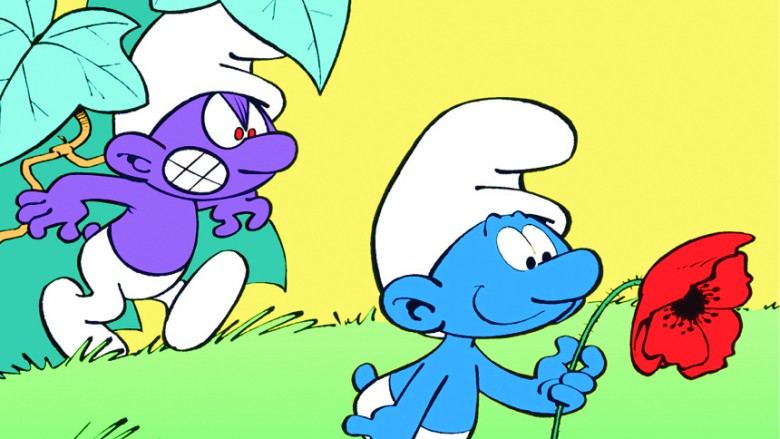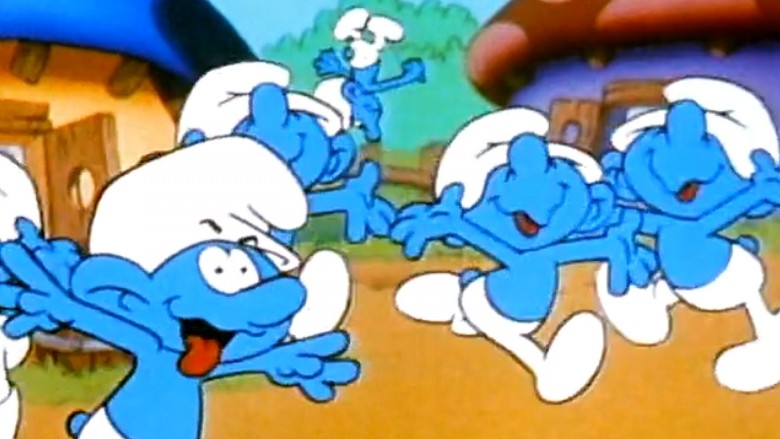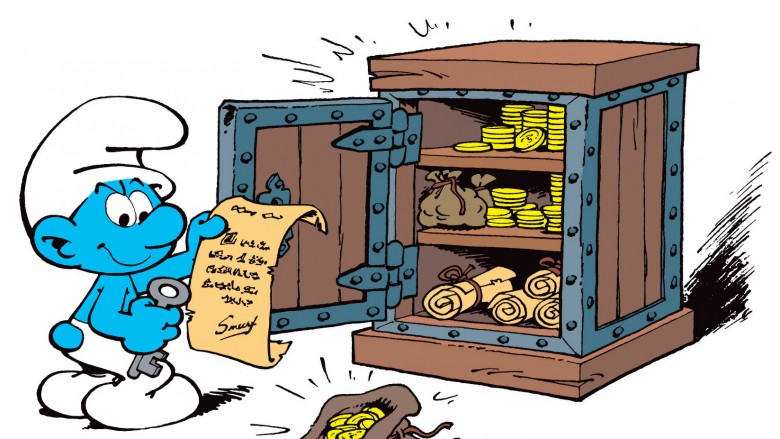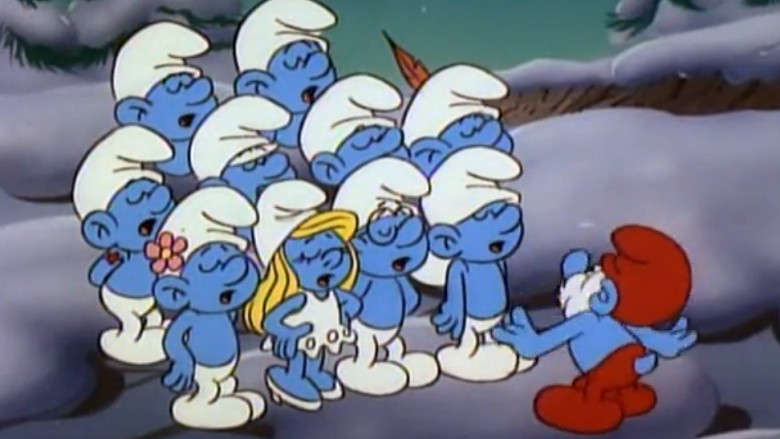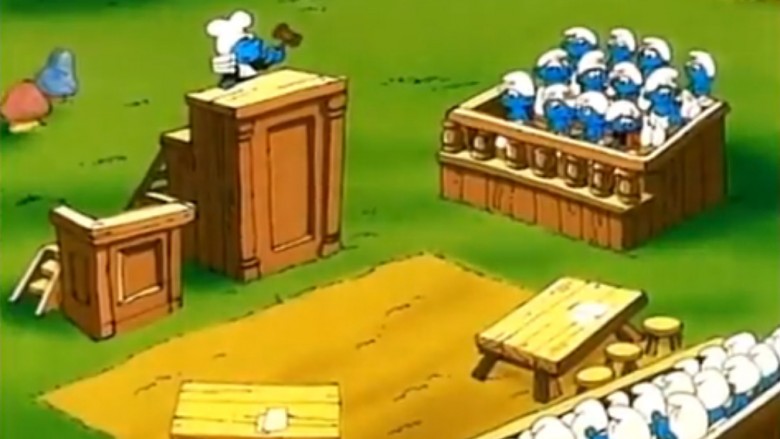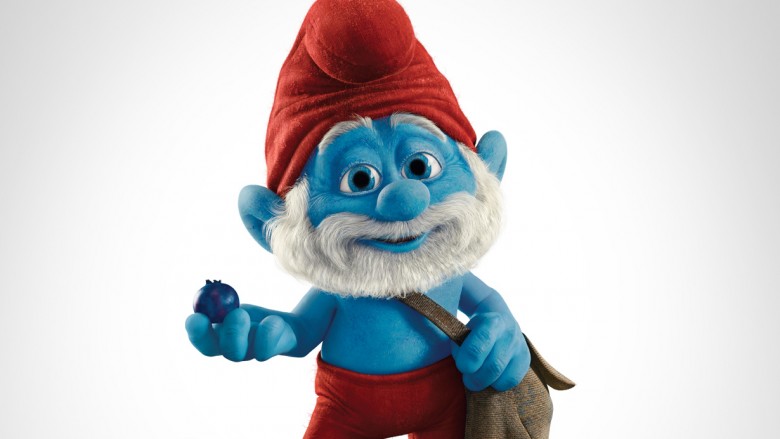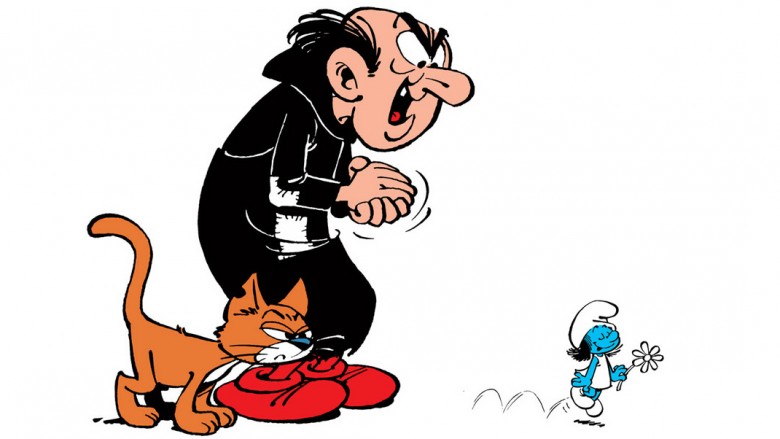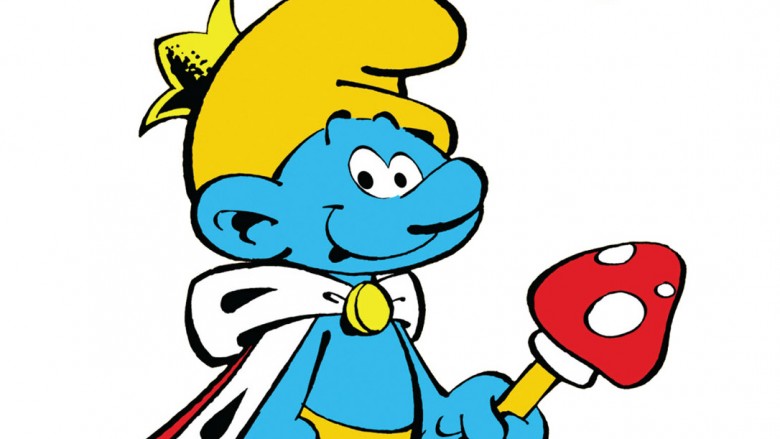The Most Terrible Things The Smurfs Have Ever Done
We may receive a commission on purchases made from links.
Little-known fact: the Smurfs first debuted in a medieval fantasy comic called Johan and Peewit, a medieval fantasy comic created by the Belgian cartoonist Pierre Culliford, better known to fans as Peyo. Another little-known fact: they're pure evil. The second that Papa Smurf turns his back, they lie, steal, cheat, and kill. Papa Smurf, who spends most of his time teaching kids about the benefits of communism, isn't much better.
Or to put it in language they can understand: the Smurfs are smurfy little smurfs who deserve to have the smurf smurfed out of them. Not that it'll happen, of course. At this point, nothing—not even a 13 percent Rotten Tomatoes score—can save us. Watch 2017's Smurfs: The Lost Village, and despair. There is no escape.
They promoted racial stereotypes
Despite being terrible, vile, and cruel creatures, kids love the Smurfs. They have ever since the Peyo debuted the Smurfs in "The Flute with Six Holes." When Peyo wrote and drew the Smurfs' first-ever solo story in 1958, their popularity skyrocketed, and in 1963, Peyo published the first book-length Smurf adventure, The Black Smurfs.
You can probably see the problem. Structurally, The Black Smurfs (which was renamed The Purple Smurfs in America) is an early example of a zombie fiction, telling the story of a Smurf who is stung by a fly, turns black, and proceeds to infect the rest of the village. According to one scholar, the story reinforces black stereotypes that emerged way back in Britain's colonial era: the black Smurfs can't speak, are generally bestial in both mind and body, are dumb as rocks, and need to be rounded up and cured.
That's not the only example of thinly veiled racism that pops up in Smurfs comics, either. In The Astro Smurf, the Smurfs dress up as a savage alien race called the Swoofs who happen to look an awful lot like the racist caricatures popularized by Little Black Sambo. (Again, the colors were changed for the American reprint.) Gargamel, the miserly wizard who hunts the Smurfs and loves gold, reminds some readers of anti-Semitic stereotypes.
Is all of this intentional? It's hard to tell. We could ask Peyo, but he died in 1992. These days, most fans seem to agree that Peyo wasn't intentionally racist but that he did fall into prejudiced attitudes that permeated Belgium in the 1950s—but honestly, it doesn't matter. The Smurfs have perpetrated so many other heinous crimes, what's the point of letting them slide on this one? They're no good either way.
They're all drug addicts
Think about it: what do the Smurfs really do? Obviously, they get into a lot of trouble. Otherwise, there'd be no show. Every once in a while, they fend off attacks from the evil wizard, Gargamel, and most of them have jobs—heck, most of them are even named after their chosen professions. But Smurf Village doesn't have any bars, or nightclubs, or movie theaters, and there doesn't seem to be a lot to do in the Smurfs' downtime.
And so, to pass the time, the lovable blue scamps turn to drugs. Constantly. It's not subtle, either. In the Season 6 episode "Lure of the Orb," a witch gives Poet Smurf a glowing stone that "lifts spirits and inspires the uninspired," which is also the product summary for everything listed on Leafly. The orb is also incredibly addictive, and it isn't long before the practically the entire village is fighting over the object, eager for the next fix.
It doesn't end there. In "Reckless Smurfs," Daredevil Dust lowers the Smurfs' inhibitions and makes them go crazy. In "Forget Me Smurfs," Brainy Smurf and Smurfette peddle flowers that supposedly erase the Smurfs' memories, but really just put them into a euphoric daze. It's very, very strange for a children's show, especially since the repeated exposure to various narcotics doesn't seem to have any long-lasting side effects. So, there you have it, kids: drugs are perfectly fine, as long as you're bright blue and only three apples tall.
Finance Smurf invented corruption and poverty
Much to the chagrin of every child who dreamed of being a corporate accountant when he or she grew up, Finance Smurf never made it onto the Smurfs cartoon show. He did, however, star in his very own volume of the comic series. In "The Finance Smurf," one of the Smurfs learns about money from a human ally and promptly starts ruining the Smurfs' socialist community by establishing an official treasury.
As you can imagine, it doesn't go well. Finance Smurf gives every member of the village 100 gold coins, but gives himself 200—you know, to cover expenses. The Smurfs that have tangible skills, like Baker Smurf and Farmer Smurf, clean up. Others, like Jokey Smurf and Poet Smurf, become poor. Finance Smurf builds a bank so he can give loans to the lower-class Smurfs, but Farmer Smurf doesn't trust the establishment and buries his money in the forest. Smurfette doesn't get paid for her work at all, because she's a woman and nobody wants to give her money in exchange for her help.
So it goes, until Papa Smurf and a few others are destitute and forced to leave the village. Others follow, reneging on their financial obligations. Eventually, Finance Smurf owns the entire village, which leads him to realize that money isn't everything, forgive everyone's debts, and lure everyone back home.
And how much does it cost to learn this lesson about the evils of capitalism? Why, only $5.99 on the leading internet retailer Amazon.com, of course.
They killed a stranger by singing
If you don't have The Smurfs' theme song stuck in your head, well, congratulations. You do now. And yet, it turns out that the insidiously catchy tune that signaled the start of every Smurf adventure is only the second most evil song that the little blue miscreants know. In "The Smurfs' Christmas Special," Papa Smurf and his crew of mini-marauders unleash a tune titled "Goodness Makes The Badness Go Away," which sounds fine, except that in this case "badness" means a living human being and "go away" is a euphemism for straight-up murder.
"The Smurfs' Christmas Special" might actually be one of the darkest holiday specials of all time—Gargamel even trades children to an evil warlock in exchange for a spell he uses to destroy the Smurfs' village—but it doesn't get worse than the climax, in which the same warlock traps the lost kids in a ring of fire and begins performing a satanic ritual that'll send them on "their final journey." That's when Papa Smurf assembles his deadly chorus and sings the warlock into oblivion, saving both the hostages and Christmas and traumatizing every child in the audience in the process.
Yes, the warlock was a bad dude and deserved what he got, but the whole thing raises a number of difficult questions. For example, why did Papa Smurf know a murder song in the first place? Has he used it before? And, most troubling, what's to stop him from using it again?
Brainy Smurf framed Clumsy Smurf for child neglect
Not only is Brainy Smurf a complete and utter fraud—in Peyo's original comics, he's just known as Smurf with Glasses and isn't actually that smart—but he's got no problem twisting the law to suit his own needs. To wit: in "The Smurfy Verdict," Brainy loses Baby Smurf in the woods while picnicking, then blames his negligence on Clumsy Smurf, who'd been annoying Brainy all day. Papa Smurf refuses to punish Clumsy without a "fair" trial, however, so Brainy locks Clumsy in a cage and throws together a courtroom, complete with a judge and jury.
Except the whole thing is rigged. The only Smurf who can prove Clumsy's innocence is Baby, who's called to testify but can't talk. Brainy is really the only Smurf with any kind of legal knowledge, which he uses to manipulate the court to get the verdict he wants. Even worse, as the charade unfolds, Baby Smurf wanders off again, as Brainy's too busy framing his friend to pay attention.
Clumsy eventually finds Baby, while Smurfette discovers incriminating cakes stashed in Brainy's jacket, and justice is eventually served. Still, it's harrowing to think what would've happened if Clumsy had been found guilty because Papa Smurf can be kinda scary.
Papa Smurf supports a dictatorial government
Despite what you might've heard, the Smurfs' hats do not make them members of the Ku Klux Klan. The popular but totally untrue theory claims that the Smurfs' pointed white hats are a veiled reference to the robes worn by the KKK. Conspiracy theorists claim that's Papa Smurf's headgear really cements this argument—after all, KKK leaders wear the color red, not white, just like the Smurf Village's patriarch.
That's ridiculous, of course. Papa Smurf's distinctive hat can't be KKK paraphernalia because it's already a symbol of the Reign of Terror, which consumed France in 1793 and 1794. Technically, the cone-like, floppy hats the Smurfs wear are called Phrygian caps, and they became popular during the French Revolution and the Reign of Terror. Red Phrygian caps like Papa Smurf's were symbols of allegiance to the Revolutionary Tribunal and the Committee of Public Safety.
If the name didn't tip you off, the Reign of Terror isn't exactly a bright spot in French history. During the Terror, thousands of enemies of the young government were killed, either via public beheadings (of which there were 16,594 across France) or unofficially sanctioned murder. The exact body count isn't known, but historians estimate that some 250,000 French citizens died during the Terror, largely at the Tribunal's hands.
In other words, that isn't the kind of thing you want to see your leaders aspire to. Watch out, Smurflings. You don't know what Papa Smurf's thinking behind those kind eyes and that bushy beard. And given what we know about the Smurfs' easily manipulated legal system, it's only a matter of time before some unlucky Smurf finds himself strapped into a guillotine.
Every single thing that Smurfette did
Smurfs don't reproduce via sex—it's well-established in Smurfs canon that babies arrive via stork—and they only have one natural gender, male. And yet, Smurfette exists. How is that possible? Quite simple, as it turns out: Smurfette is the product of Gargamel's black magic and is intended to destroy the Smurfs from within via distraction, resentment, and jealousy.
Just look at what you need to create a Smurfette from scratch. In the cartoon, Gargamel uses "sugar and spice (but nothing nice)," half a pack of lies, blue clay, and crocodile tears as a base, with the "hardest stone" serving as a heart. In the comics, he adds a pint of bad faith, a thimble of gluttony, a candle that has burned at both ends, a handful of wrath, and some bias and coquetry for good measure.
That all adds up to a pretty nasty creature, and at first, Smurfette lives up to her reputation, shamelessly flirting with the Smurfs and driving them mad with jealousy, while also acting as Gargamel's spy. Papa Smurf eventually "saves" Smurfette, transforming her from a raven-haired vixen into a blonde beauty in high-heel pumps, which certainly didn't give any '80s girls body image issues.
But does it really work? In the episode "Romeo and Smurfette," the Smurfs come down with a case of spring fever, and all of them—even Papa—try to win Smurfette's hand in marriage. In the comic story "The Olympic Smurfs," nobody wants to compete in Smurf Village's sporting competitions until they learn that the grand prize is a kiss from Smurfette. In "Smurfette Unmade," she even reverts back to her original, black-haired design, implying that there's still been some evil in her all this time. Her look might've changed, but years after her transformation, Smurfette is still causing havoc in the village—just like Gargamel intended.
King Smurf turned Smurf Village into a fascist state and started a civil war
In the Smurfs' socialist utopia, Papa Smurf is the first among equals, and it's only when he's not in the picture that the other Smurfs' selfish, power-hungry natures come out. For example, in "King Smurf," after Papa leaves to find ingredients for a potion, the rest of the Smurfs hold an election to figure out who should be in charge. One previously unnamed Smurf fills his comrades' heads with vague promises he can't actually fulfill, bribes them with parades and raspberry juice, and holds rallies championing his greatness.
Unsurprisingly, the anonymous Smurf wins and immediately declares himself king. The newly crowned King Smurf appoints Hefty as the chief of his royal guard, puts the other Smurfs to work building a grand palace, and starts an authoritarian regime in which his enemies are thrown into prison.
Naturally, the other Smurfs don't take kindly to living under authoritarian rule, and a group of rebels starts organizing an armed resistance. Before long, a full-on war breaks out, and the rebels storm King Smurf's castle using tomatoes as weapons and pilfered chemicals as bombs. The carnage only ends when Papa Smurf returns from his expedition and gives his charges a stern talking-to, rechristening the authoritarian as Pretentious Smurf and forcing him to clean up the mess he made.

